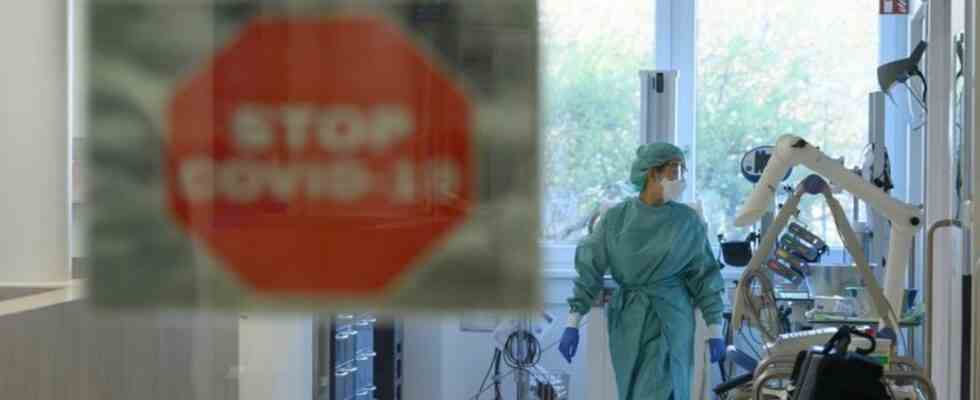Pandemic
Concerns about Corona staff shortages in many clinics
An intensive care nurse walks across the aisle in the corona intensive care unit of the Dresden University Hospital. Photo: Robert Michael/dpa-Zentralbild/dpa
© dpa-infocom GmbH
Summer vacation, increasing number of corona cases, absences due to illness and in some places still strikes. Many clinics are again working almost to their limit. But the situation is not so tense everywhere.
The corona summer wave and the associated absences from illness are causing problems for many clinics in Germany. Only in a few federal states does the situation seem to be a little more relaxed at the moment, according to a survey by the German Press Agency. However, the overriding tenor is: It could come to a head in autumn.
The corona-related absences from illness and the general shortage of skilled workers in combination with the current holiday season are currently burdening many hospitals and are already having an effect on the patients in some cases. In Bavaria, Baden-Württemberg and some other federal states, less urgent operations have already had to be postponed due to the absence of hospital staff.
The number of Covid 19 patients in the intensive care units has been increasing again for some time. On Wednesday, the German Interdisciplinary Association for Intensive Care and Emergency Medicine (Divi) reported 1238 seriously ill people being treated with Covid-19 in intensive care units. That was 25 more than the day before. Federal Health Minister Karl Lauterbach warned in the evening, referring to the increasing number of cases and staff shortages: “In autumn, the range of infections that we can allow is not large”. Germany is by no means in an endemic situation.
“There are more and more failures in clinics, not across the board, but selectively. At certain clinics we really have 20 to 30 percent of the staff absent, »says Eduard Fuchshuber from the Bavarian Hospital Society (BKG). Either the employees themselves are infected or they have to look after children who are at home because of Corona.
Baden-Wuerttemberg
The Baden-Württemberg Hospital Society (BWKG) also refers to the shortage of skilled workers and assumes that 10 to 15 percent of the hospital beds cannot currently be occupied, although the corona situation is still relatively stable. The BWKG general manager Matthias Einwag warns that the situation would worsen if there were new waves of corona or flu.
Berlin
In Berlin hospitals, too, the increasing number of corona cases and sick reports from employees are already noticeable. “The workforce has already been greatly reduced due to infections and quarantine,” says Marc Schreiner, Managing Director of the Berlin Hospital Society.
Schleswig Holstein
In the hospitals in Schleswig-Holstein, corona infections are also leading to an aggravation of the staffing situation. According to the managing director of the Schleswig-Holstein hospital company, Patrick Reimund, around 1,000 of the around 40,000 employees are missing because of Corona.
North Rhine-Westphalia
There is also a corona-related and general shortage of skilled workers in North Rhine-Westphalia. The situation is aggravated by the strikes at the university hospitals that have been going on for weeks. However, the NRW Ministry of Health assessed the situation as “tense but manageable”.
Hamburg
In Hamburg, the situation is not yet worrying, despite the sick leave among employees. “At the current level, we are still able to guarantee care in all medical areas in the Hamburg Asklepios clinics,” said a spokesman. However, in a few individual cases, planned examinations and treatments had to be postponed at short notice due to unforeseen staff shortages that could not be compensated for immediately.
The German Interdisciplinary Association for Intensive Care and Emergency Medicine (DIVI) opposed possible shorter isolation times for infected clinic employees. “The risk that an employee will then infect the patient is much higher than the benefit of the work that is generated,” said President Gernot Marx of the weekly newspaper “Die Zeit”.
Brandenburg
In some federal states and their clinics, on the other hand, the situation is more relaxed: In the large hospitals in Brandenburg, for example, there are still no bottlenecks due to staff shortages. There, the sickness rate among staff is comparable to that of the same period last year and has so far been well balanced in the clinic, said a spokeswoman for the Potsdam Clinic Ernst von Bergmann.

